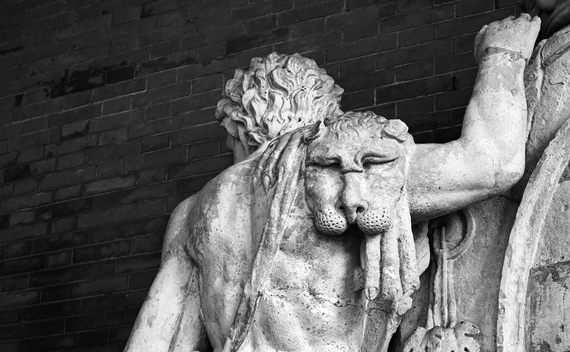When I visited the exhibition "Founding Myths" at Musée du Louvre in Paris few weeks ago, I was surprised to see a statue of Hercules standing next to Darth Vader's original bust. Is George Lucas really the Homer of our times? Maybe. But there were few contradictions that unsettled me. Hercules springs from ancient oral tales, while Vader is a synthetic modern figure of evil. The former's tale highlights man's boldness at the dawn of civilization, the latter is a construct of the nineteen-seventies who lives far, far away in the future. Hercules is the hero of a long poem, whereas Vader earned his authority from the screen. Vader was born from a kind of commercial storytelling that did not exist in Ancient Greece. So in what way do these figures belong to the same theme? Are they equal myths? Should these semi-gods sit at the same table?
One of the foremost thinkers in the 20th Century whose work sketched the functions of myth throughout many different societies was the Anthropologist Claude Lévi-Strauss. His work showed that, despite many variations in theme and content, myths from disparate places share some similarities. These intersections reveal certain truths that speak to some sort of universal human experience, with its stack of fears and passions. This "structural" core emphasizes how men use myths to reflect. This first breach led to more mainstream comparisons of myths, for instance through artwork collection in the writer André Malraux's "Musée Imaginaire" (imaginary museum), in which massive artworks from different cultures are juxtaposed with one another, or more recently, the Louvre exhibition where Darth Vader stands next Hercules.
The philosopher Roland Barthes contended that anything could be a myth. If there's heat, there's myth. Institutions, products, people--let's add today's memes and jokes--they should all have the same chances to join our collective imagination's starry vault of mythology. Broadcasting is mythicizing. Your portrait's on the front page of the New York Times? You're a myth. The most watched video on YouTube? That's a myth. The Big Mac? A myth. The guy who played Burt Lancaster's best friend in "The Swimmer"? I can't remember his name, but since we're talking about him now, he's a myth. As soon as we discuss the nature of an object in the open, we're mythicizing it, which make all myths equal. Nonetheless, a shift in imaginary realms--from selfless, poetic myths (Hercules) to more materialistic ones (Vader)-- has happened.
Freud formulated the hypothesis of a collective soul, "a continuum in the psychic life of all humans," and noted that there must be a transmission of mindsets from generation to generation; otherwise every newborn would have to learn everything from scratch again. Through oral stories--for example the way Nike boosted the price of the Air Jordan III by according it limited edition status or how the CD became irrelevant--the object itself gets swallowed, digested, regurgitated, and passed on to the next generation. We could appreciate these stories as cysts, crystals in the collective unconsciousness because they accrete around the object they are referring to. But these kinds of myths, Barthes' myths, are tales of the immediate, and are only entertaining anecdotes that lack an element of the sacred.
The historian and philosopher Mircea Eliade defines a myth in a different way. He says a myth is "a sacred tale that happened during a primordial era, an era of all beginnings." According to him, the myth tells the evolution of how supernatural beings or superior forces made the world we live in today. Myths are the stories of creation told through sparks of mysterious forces. For Eliade those are special tales because they resist us. Since they're recounting the actions of supernatural beings, they may be supernatural themselves, like many religious texts that are considered divine, or the words Aboriginal Australians chant as they traverse the song lines of that country. This means they're paradoxical, made by man, and also divine, and for the same reason that they're poetic.
The first poets who brought us the Ancient Greek myths were Hesiod and Homer. The former tells the story of creation of the cosmos and the latter about the Trojan War, and how gods were involved. Every chapter shows a struggle with the unknown (for example, the gods, the elements and destiny), and this informs us on human abilities to react, imagine and transcend. The myth is a duel: an extreme test that only the hero can confront, and solve. This type of myth nurtures us because it offers hope and stimulates the imagination. In this conception, Hercules would simply choke Darth Vader with one hand saying, "You were not invited to this table, Vader." But those antique tales existed when mysteries of Nature were overwhelming. This probably pressured women (mothers and nannies were probably the most prolific story tellers at that time) to use tales as a form of explanation, not only as poetic legends.
Each civilization need to create their own myths and doing so they set a new stage of ghosts, heroes, and forms that are more in tune with the contemporary. This also fulfill their need to shape the future, and express their idea of modernity. Maybe all they're doing is recycling archetypes. Both Hercules and Vader convey a message about force, power and legitimacy--archaic notions that we are eternally reshaping. When he created Darth Vader, George Lucas redesigned, "au goût du jour," Lucifer, the brightest of angels whose extraordinary gift turned into a curse. Because they rejuvenate fears and passions--the eternal forces behind myths--Darth Vader and Hercules navigate the same playground: our collective mindset. Hence they should sit at the same table and cheer.
